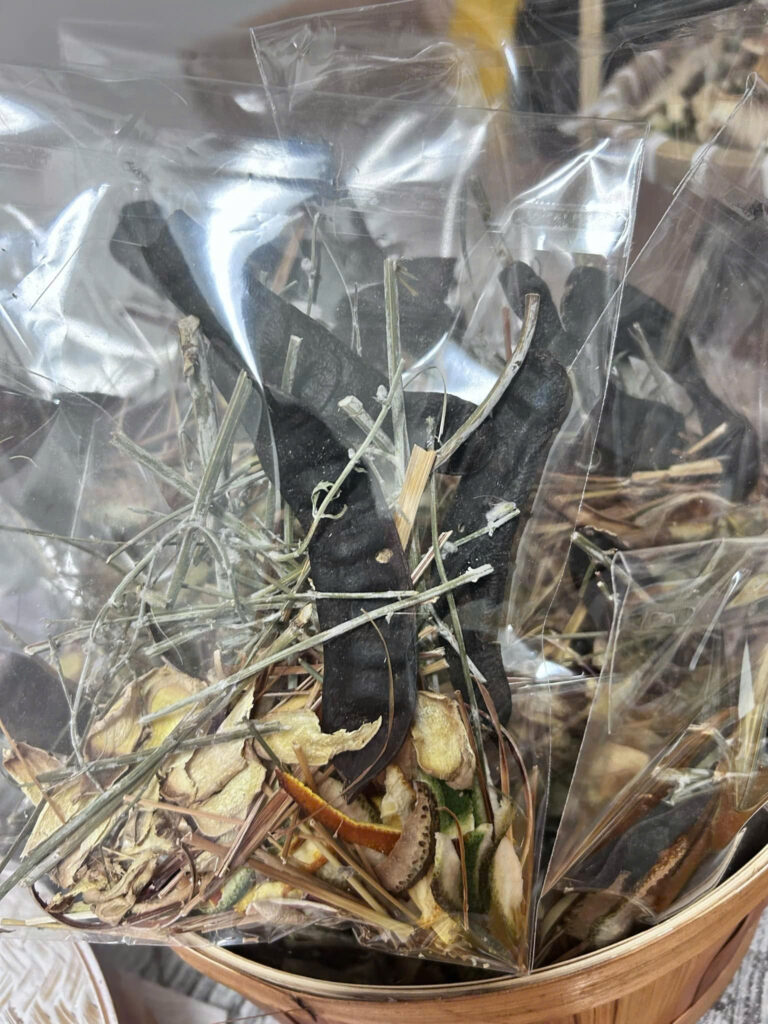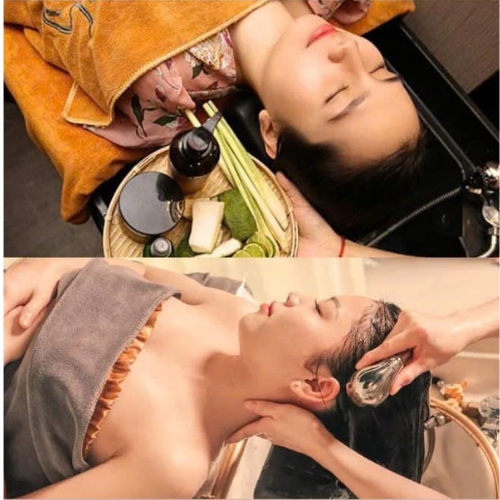Herbal hair washing is a traditional natural hair care method that utilizes completely natural ingredients and remedies, free from synthetic chemicals. This approach is highly regarded for its benefits to hair health, overall well-being, and mental relaxation.
Types of Herbal Hair Washing Available Today
Herbal hair washing has long been a preferred choice for many, especially women. This method is widely applied in various forms. You can purchase herbal ingredients to wash your hair at home, including pre-packaged herbal sachets for convenience, which are ideal for those unfamiliar with herbal shampoos.
Alternatively, if you wish to combine relaxation and massage to improve your well-being, you can visit spas or beauty centers offering herbal hair washing (also known as “nourishing hair washing”) services. These services are provided by skilled technicians, offering a soothing experience.
Due to its popularity, herbal hair washing services are increasingly common and expanding beyond city limits. Today, even rural areas and smaller towns offer this type of hair care service.

Why Should You Opt for Herbal Hair Washing?
As mentioned earlier, herbal hair washing offers numerous benefits for your hair, while also providing a pleasant and relaxing experience. But what makes these herbal ingredients particularly effective, especially in the context of “nourishing hair washing” services?
Relaxation and Stress Relief
Most herbs have a gentle and pleasant fragrance. When you use these herbs for hair washing, the first thing you’ll notice is how their scent helps to significantly improve your mood and relax your mind.
The experience becomes even more delightful if you receive herbal hair washing at a spa, where you can enjoy the soothing touch of skilled therapists, natural sounds, and the aromatic fragrance of the herbs. This creates a perfect ambiance for relaxation. Additionally, massage techniques for the neck, shoulders, and head will help relieve stress and tension.
Improved Blood Circulation
During a herbal hair wash, you frequently perform scalp and neck massages. These actions help the nutrients from the herbs penetrate deeper into the scalp, stimulate blood circulation, and enhance oxygen supply while supporting lymphatic flow to the cells. As a result, the scalp becomes healthier, and the hair strengthens. This process can also alleviate headaches and insomnia.
Enhancing Hair Health
Beyond the mental and physical benefits, the primary function of using herbs for hair washing is to improve the health and appearance of your hair. A healthy scalp promotes the optimal development of hair follicles, leading to stronger and more vibrant hair growth.
Moreover, scalp massages will promote faster, longer, thicker, and shinier hair growth. They also help in significantly improving the condition of dry, brittle, and damaged hair from root to tip.

Reducing Dandruff and Scalp Conditions
Herbal ingredients also serve to exfoliate and thoroughly cleanse the scalp. Consequently, issues like dandruff, scalp fungus, and other scalp conditions can be effectively addressed and treated.
Common Herbal Ingredients for Hair Washing
While the term “herbal” might suggest rare and hard-to-find ingredients, many of these herbs are quite accessible and might even be found in your own kitchen.
Here are some commonly used herbs in herbal hair washing, both at home and in luxurious spas and beauty centers:
- Soapberry: Known for its anti-inflammatory properties, soapberry effectively treats scalp conditions, relieves itching, and reduces dandruff due to its main components, saponins and saponaretin.
- Lemongrass: Lemongrass primarily helps to relax the mind with its pleasant aroma and relieves stress. Additionally, its essential oils help to prevent hair loss.
- Grapefruit Peel: The essential oils in grapefruit peel provide a soothing aroma and contribute to shinier, darker hair while promoting thicker and longer hair growth.
- Holy Basil: This herb moisturizes the scalp and enhances the shine of the hair.
- Fo-ti: Known as a miracle herb for improving damaged and brittle hair, Fo-ti helps prevent hair loss, scalp aging, and premature graying.
- Cinnamon: Similar to lemongrass, cinnamon has a pleasant scent and helps prevent dandruff.
- Mulberry Leaves: Mulberry leaves stimulate thicker hair growth, prevent premature graying, and improve hair damage.
- Crabgrass: The primary benefit of crabgrass is to make hair stronger and shinier.

Should You Wash Your Hair with Herbal Products at Home or Go to a Spa?
Both home herbal hair washing and spa treatments offer distinct advantages and drawbacks. Your choice between the two will depend on your circumstances and personal preferences. Here’s a detailed comparison:
Herbal Hair Washing at Home
Advantages:
- Customization: You can choose your preferred herbs and scents.
- Frequency and Flexibility: You can wash your hair as often as you like and at your own convenience.
- Quality Control: You have control over the quality of the herbs you use.
- Cost-Effective: Generally, it’s more affordable as you only need to purchase the herbs.
Disadvantages:
- Lack of Expertise: Without a thorough understanding of herbal properties, you might mix ingredients incorrectly or use improper techniques, leading to less effective results.
- Basic Ingredients: You might be limited to using only basic, easily accessible herbs.
- Time-Consuming: Preparing and processing the herbs can be time-consuming.
Spa Herbal Hair Washing
Advantages:
- Expertise: Trained professionals use their knowledge to select and apply the most effective herbs for your specific needs.
- Comprehensive Experience: Spa treatments often include additional services like scalp massages and relaxing environments, enhancing the overall experience.
- High-Quality Products: Spas usually use high-quality, well-prepared herbal blends.
Disadvantages:
- Cost: Spa treatments are generally more expensive than home remedies.
- Scheduling: You need to book appointments and adhere to the spa’s schedule.
Should You Use Hot or Cold Water for Washing Your Hair?
Hot Water:
- Pros: Opens up the hair cuticles, which helps with cleaning the scalp and hair thoroughly. It can also improve blood circulation to the scalp, promoting hair growth.
- Cons: Excessive heat can strip natural oils from your hair, potentially leading to dryness.
Cold Water:
- Pros: Helps to close the hair cuticles, which can make your hair look shinier and smoother. It also helps to lock in moisture and prevent hair from becoming too dry.
- Cons: Might not cleanse as effectively as hot water and may not be as comfortable, especially in cold weather.
In summary, if you prefer customization and cost-effectiveness and don’t mind the preparation time, washing your hair with herbal products at home might be suitable. However, for a more refined experience with expert care and additional benefits, visiting a spa could be the better choice.

Herbal Hair Washing at a Spa
Advantages:
- Professional Experience: Enjoy a professional service with herbal hair washing combined with neck, shoulder, and back massage, which aids in blood circulation.
- Relaxing Environment: The peaceful spa atmosphere, gentle scents, and soothing sounds enhance relaxation.
- Improved Well-being: Promotes mental and physical health through a comprehensive and calming experience.
- Scientific Approach: The herbal blends are used in a scientifically formulated manner, and you can experience rare herbs that might be difficult to find on your own.
- Expert Selection: Technicians choose the most suitable herbs to meet your specific hair improvement goals.
- No Preparation Required: The spa takes care of processing and preparing the herbs, saving you time.
- Convenient for Busy Individuals: Ideal for busy professionals who may not have time for home treatments.
- Additional Beauty and Relaxation Services: You can combine herbal hair washing with other beauty and relaxation treatments offered by the spa.
Disadvantages:
- Finding a Spa: It can take time to search for and select a reputable spa.
- Uncertainty about Ingredients: There may be concerns about whether the herbs used are safe and suitable for your needs.
- Higher Cost: Spa treatments generally come with a higher price tag compared to home methods.
Choosing between home and spa herbal hair washing ultimately depends on your preferences for convenience, cost, and the overall experience you are seeking.

Facts About Herbal Hair Washing You Need to Know
Although herbal treatments can help improve hair damaged by external factors, they are not without limitations. Here are some truths about herbal hair washing that you should be aware of to avoid misconceptions:
Herbs Do Not Provide Instant Smoothness
It’s a fact that herbal treatments will not make your hair smooth and shiny immediately. This effect is typically achieved with chemical shampoos containing silicones that create a shiny coating on the hair.
Can Cause Hair to Feel Dry and Greasy
Herbal shampoos use completely natural ingredients. Therefore, if you want your hair to become soft and healthy, you need to give it time to absorb the nutrients from the herbs. Initially, your hair may feel dry and rough. This is because the herbs are working to balance the natural oils on your scalp and remove harmful residues from previous chemical products. After this adjustment period, your hair will gradually become naturally smooth and shiny.
In summary, while herbal hair washing offers many benefits, it may require some patience and adjustment time to see the full effects.

Not for the Impatient
As mentioned earlier, you won’t see your hair becoming beautiful and healthy after just a few uses of herbal shampoos. In fact, initial experiences of greasy, sticky, or dry hair might make you feel frustrated and think that this method isn’t working.
Therefore, those who lack patience might find this method unsuitable for them. For those who are patient, over time, you’ll notice that the initial issues of greasiness and stickiness will gradually diminish and eventually disappear. At this point, your hair will become soft, smooth, and shiny.
Herbs Are Not a Miracle Cure
Herbs cannot magically transform your hair if you constantly dye, straighten, or change your hairstyle frequently. Herbs are not a miracle cure. So, if you frequently change your hairstyle, you must accept that your hair may remain damaged.
While herbal hair washing can offer some improvement, the benefits are often modest and gradual.

Some Tips for Using Herbal Hair Wash
Herbal hair wash offers numerous benefits for your hair. To fully achieve these benefits, here are some important points to keep in mind:
Stop Using Conditioner 2 Weeks Before Switching to Herbal Shampoo
We often use both shampoo and conditioner together. Conditioner covers the hair with a layer of silicone, giving it a shiny and smooth appearance. After prolonged use, your hair gets coated with a thick layer of silicone, making it feel softer and shinier.
Before switching to herbal shampoo, you should stop using conditioner for at least 2 weeks. During this period, only using shampoo will help gradually remove the silicone layer from your hair. This will shorten the adaptation time for the herbal shampoo to work effectively.
Avoid Using Other Hair Products
If you decide to use herbal shampoo for hair care, discontinue the use of other shampoos or hair products. Combining different products can diminish the effectiveness of herbal treatments. Additionally, this can cause your hair to constantly adjust to various ingredients, leading to discomfort.
A good alternative is to use natural hair oils such as grapefruit oil or He Shou Wu (Fo-ti) to improve your hair from within.

Use Warm Water for Washing Your Hair
Warm water helps to open up the pores, effectively removing dirt, excess oil, and bacteria from your scalp during the wash.
Here’s a tip for using herbal shampoo:
Divide the Washing Process into Two Steps:
- First Step: Use half of the herbal shampoo mixture to wash your hair with warm water as usual.
- Second Step: After rinsing, use the remaining half of the herbal shampoo, add the juice of half a lemon, and apply it to your hair. Massage your scalp and then rinse thoroughly with cold water.


